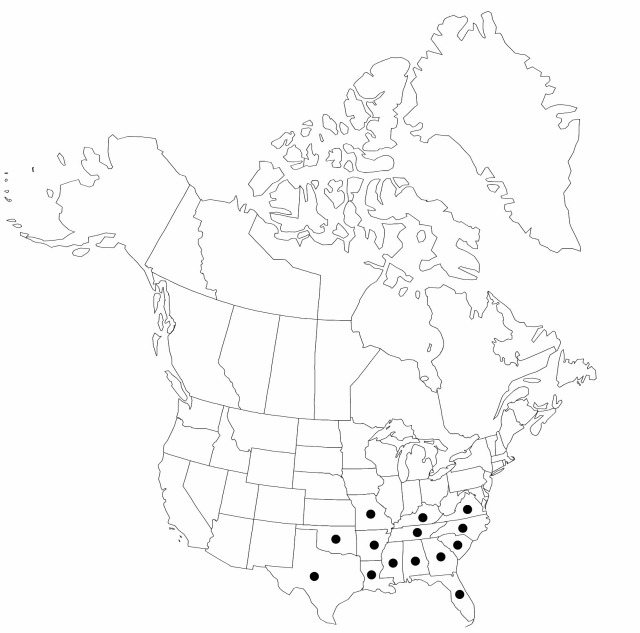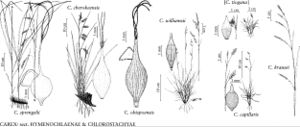Carex cherokeensis
Ann. Lyceum Nat. Hist. New York 1: 71. 1824.
Plants with short-creeping rhizomes, forming dense colonies. Culms brown to chestnut at base, surrounded by remains of old leaf bases, but not conspicuously fibrillose; flowering culms 30–80 mm, usually longer than leaves at maturity, 1–2 mm thick, glabrous but finely scabrous within inflorescence. Leaves: sheaths glabrous, basal ones dark chestnut, grading to light brown and green on back, all bearing blades, sometimes very reduced in size on basal ones; sheath fronts brown-hyaline or membranous, darker brown and often red dotted toward apex; blades rigid, flat or channeled near base, 2.5–7 mm wide, glabrous but margins, edges of adaxial surface, and midrib of abaxial surface finely scabrous. Inflorescences: peduncles of lateral spikes slender, to 100 mm (proximal spikes) or to 30 mm (distal spikes), minutely scabrous; of terminal spike 3–20 mm, glabrous; proximal bracts much shorter than inflorescences; sheaths 10–75 mm; blades 1.5–3.5 mm wide. Lateral spikes 4–12, 1–3 per node; proximal spikes well separated, arching, pistillate with 20–50 perigynia attached 1 mm apart, cylindric, 15–45 × 6–9 mm; distal spikes androgynous or staminate, usually crowded near apex. Terminal spike staminate, sometimes compound at base, 20–60 × 2.5–4 mm; the set of predominantly staminate spikes usually conspicuously raised above predominantly pistillate ones. Pistillate scales pale hyaline tinged with light brown, with midrib green to golden green, ovate to elliptic, nearly as long as mature perigynia, gradually narrowing to acuminate or short-cuspidate apex, glabrous except scabrous midrib. Perigynia green to straw colored, sparsely red dotted, 2-ribbed and finely 7–10-veined, slightly inflated around achene, ovoid, 5–6.5 × 1.5–2.5 mm, membranous, base rounded, apex gradually tapering to beak, glabrous; beak bidentate, 2.5 mm including teeth, teeth hyaline, narrow, to 1 mm. Achenes substipitate, 2–2.5 × 1.2–1.7 mm.
Phenology: Fruiting late spring–early summer.
Habitat: Floodplain forests, mesic deciduous forests, wet clearings and swamp forests, stream banks, acid seeps, margins of sinkholes, dolomite glades
Distribution

Ala., Ark., Fla., Ga., Ky., La., Miss., Mo., N.C., Okla., S.C., Tenn., Tex., Va.
Discussion
Selected References
None.
